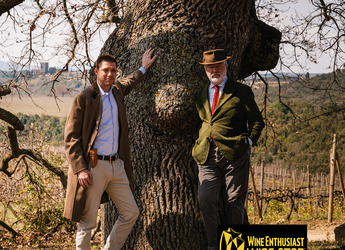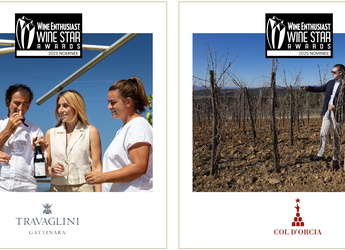
Portillo Wines Your Gateway to the Uco Valley

From the Uco Valley of Argentina’s Mendoza winemaking region at the foot of the majestic, snow-covered Andes Mountains, this remarkable collection is grown at some of the highest elevations on the planet. Portillo wines are easy to drink, fresh, and fruit forward, meant for everyday enjoyment.
The name Portillo, Spanish for “portal” or “gateway,” is inspired by a high-elevation mountain pass along the Andes which opens a path directly to the vineyards. Portillo wines are crafted by winemaking pioneers Bodegas Salentein, who established the first and largest wine estate in the Uco Valley. In a location that was once barren and remote, winemakers had a little bit of vision (and a lot of faith) to uncover the quality and character of this remarkable appellation within the Mendoza winemaking region.
Today, Portillo is honored to share their stunning Uco Valley wines with customers in the U.S. The 11 wines in their collection are beautifully crafted by winemaker Carlos Bauzá and his team, who are dedicated to encapsulating Mendoza’s vibrant culture inside every bottle of Portillo. Winemaking is overseen by the legendary José “Pepe” Galante, father of modern winemaking in Argentina. Wines are produced in a state-of-the-art gravity-flow winery constructed on a slope to encourage gravity to move the wine throughout different levels of the winemaking process. Portillo wines honor and promote the culture and people of Argentina, while respecting the land from which they come.
Portillo Wines Highlights
The entire Portillo range is vegan friendly, with no inputs of animal origin used in the production process.
Portillo wines are meant to be enjoyed with food! Pairing suggestions can be found right on the front label.
While vines in Mendoza date back to the 1500s, the Uco Valley was developed as its own sub-region of winemaking in the late 1990s. Portillo is made by Bodegas Salentein, who established the first and largest wine estate in the Uco Valley in 1996.
Portillo’s varietal wines express the Uco Valley’s uniqueness and freshness — they are a true representation of each grape’s distinctive character.

-
Founded
1996 -
Location
Uco Valley, Mendoza, Argentina -
Follow On
Welcome to the Uco Valley
Mendoza is renowned for its premium, high-quality grapes and (rightly) has a reputation for producing outstanding wines from some of the highest altitudes in the world. However, the Mendoza sub-region of the Uco Valley has become Argentina’s new crown jewel. Once desolate and barren, it has emerged as a highly sought-after region, thanks in large part to the curiosity, innovation, and substantial viticultural investments of Portillo’s parent winery, Bodegas Salentein.

High Elevations Yielding World-Class Wines
Portillo wines are grown at some of the highest elevations on the planet. Vineyards on the estate are located at heights between 3,500 and 5,600 feet above sea level. Intense sunlight at higher elevations means grapes are exposed to more ultraviolet rays, which help to mature the fruit and build up natural sugars. Cooler nighttime temperatures allow the fruit to hang for longer, resulting in an outstanding balance between sugars and acidity.
The soil in the Uco Valley is primarily alluvial and sandy, with good permeability and drainage. The Portillo vineyards are drip irrigated with pure water taken directly from the melting snowcaps of the Andes thanks to nearby streams and an aquifer that sits below the vineyard. Minerals in the water collected along the way aid in plant growth and help produce a lower pH level in the grapes, which gives the wine a higher acidity, more color, and greater aging potential.

Sustainability at Portillo
Portillo’s green initiatives are numerous. Theirs was the first wine from Argentina to obtain a certification issued by the Carbon Trust Certification (an international leader in carbon reduction). The winery also adheres to the Bodegas de Argentina Sustainability Protocol, which is focused on soil management, irrigation, efficient use of water and energy, air quality, and waste management, among other things.
As the Uco Valley is a desert, maximizing water conservation is a huge tenet; drip irrigation systems have been installed in all Portillo’s vineyards and they’ve invested heavily in technology that allows them to know the precise water demand of each plant. One hundred percent of their liquid effluents are treated, providing water suitable for irrigating the estate’s alamos and eucalyptus trees.
Pesticides are avoided and soil conservation methods are also practiced. The winery uses recycled materials in bottling and packaging and they actively recycle on property (glass, cardboard, plastic, and metal are carefully separated to ensure that they are 100% recyclable).
The Portillo team embrace the natural desert landscape of the Uco Valley, with native Mendoza vegetation and indigenous cover crops planted across the property, maintaining the natural ecosystem.

Portillo’s Uniquely Designed Gravity Flow Winery
The Portillo winery in Mendoza, Argentina, represents the intersection of technology and tradition to ensure only the highest quality fruit creates world-class wines. The building is a wholly unique gravity-flow winery, with three levels that begin underground. Designed to blend seamlessly and respectfully with the environment, the winery was constructed via an innovative Cyclopean masonry technique, using local stones found in the thick sedimentary layers of the mountain valley.
The first level receives and sorts the grapes. The wines undergo fermentation on the second level and are stored on the third level. Gravity flow avoids pumping the fruit, which can break up the seeds and cause phenolic bitterness in the wine. This technology also reduces the risk of oxidation.
This cutting-edge technology results in a smooth, gentle winemaking process that preserves the full spectrum of fruit, aromas, and flavors.

Winemaker Carlos Bauzá
At the helm of the Portillo winery is winemaker Carlos Bauzá. Carlos has been Winery Supervisor, Second Line Winemaker for Still and Sparkling Wines, and now Senior Winemaker at Portillo and Chef de Cave at Bodegas Salentein. Throughout his career, Carlos has made numerous trade and fact-finding visits to several foreign wine-producing countries like France, Italy, Spain, the U.S., Chile, and Canada. These experiences have provided him with a fluency of varied production methods in diverse terroirs and microclimates, as well as aging practices. An avid motorcycle rider, he has crossed the Andes on several occasions and often rides through the Uco Valley, retracing the familiar paths of rugged beauty and basking in the warm, Mendoza sun.
All winemaking at Portillo is overseen by the legendary José “Pepe” Galante, who is considered the Father of Argentine Malbec, because he was the first in the country to vinify malbec as a single varietal wine.









